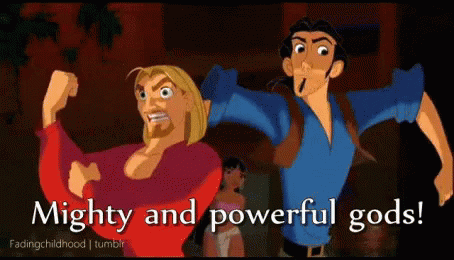Your protagonist may be a devout worshipper or a scowling miscreant who nurses a personal vendetta against higher powers.
Either way, fantasy novels are rarely set in atheistic worlds.
Religion is a critical accent thread to weave into your worldbuilding tapestry.
I’ll be expanding on the key elements to consider in building out believable religious pantheons in future posts, but for today, let’s start with making an important decision. Does your world have monogamous or polyamorous ecclesiastics?
Why does religion matter in fantasy?
Even the characters puttering around in background act based on what they believe. The structure of a religion influences the structure of society, and can provide powerful sources of conflict and points of intrigue for your stories.
So in your typical fantasy world that’s a vague throwback to the middle ages, gimme that old time religion, baby!
One God or Many: Monotheism vs Polytheism
Does your world need to be monotheistic for the sake of your theme? If you’re weaving an allegory like CS Lewis’ Chronicles of Narnia, or using your fantasy to deliver specific moral instruction, consider monotheism. Or at least consider having monotheistic nations. Not every nation in your world has to follow the same Allparent.
Bonus points if they don’t. Having multiple monotheistic religions creates massive space for characters to explore new ideas and struggle with philosophical conflicts as they tour around your world.
If you envision a big, powerful daddy god (think Tolkien’s Eru) surrounded by lower celestials (think angels), you’re probably leaning monotheistic.
Monotheistic traditions may be more likely to have an all-powerful, all-knowing, or infallible god than their polytheistic counterparts.
If you have a pantheon with different gods and goddesses, you naturally have competing philosophies. (If the gods all thought the same, you wouldn’t need a pantheon). If gods can lose to other gods, whether in battle, or philosophical debate, they’re not exactly infallible.
Mono or polytheism affects the god’s area of focus:
To survive, monotheistic traditions need to be as universal as possible. Therefore a monotheistic god or goddess needs to address broad human themes (like love, loss, life, death, and morality) that can be applied to most people’s circumstances.
A monotheistic god that focuses too narrowly (only on spear fighting, or bread making, or time-management), will quickly find itself in the company of other gods and goddesses who spring up to meet the needs of other segments of society.
In polytheistic traditions however, gods typically have different domains.
A god of craftsmen is about as likely to give good advice on courtship and marriage rituals as a goddess of hunting is to preach vegetarianism.
But Craftylord McAnvilBanger is likely to have an awful lot to say about pride in hard work and the honor of swinging a hammer. He’s relevant to specific people (craftspeople and their families).
Deities powers are also likely relevant to their domains. I’d bet a gold piece that the god of craftsman has a magic tool, and that the good of preserving vegetables has a magical relationship with salt.
In a pantheon, not every god is necessarily for everyone.
Even if a goblin received a vision from the goddess of the elves, he probably wouldn’t understand the language, and wouldn’t be particularly moved by the content.
What are your world’s needs?
Consider the difference between a sea-faring society and one that is landlocked or dug out underground.
When putting together ask yourself, “How is this society structured, and what are the people’s needs?”
This will help you determine the number of gods your society will reasonably support, and if you take the pantheon route, what their domains should be.
So, is it mono or poly?
What suits your story better?
Let me know in the comments, and thanks for reading ;)
-Lily







